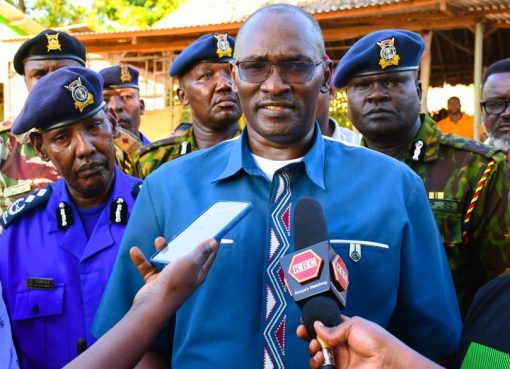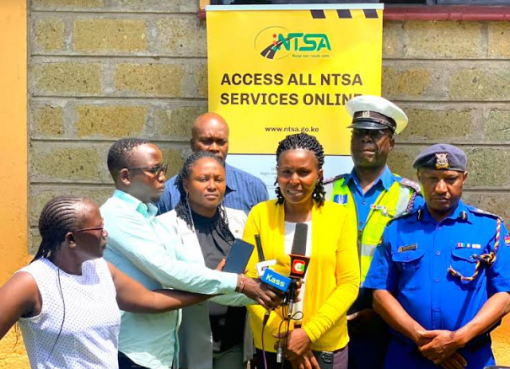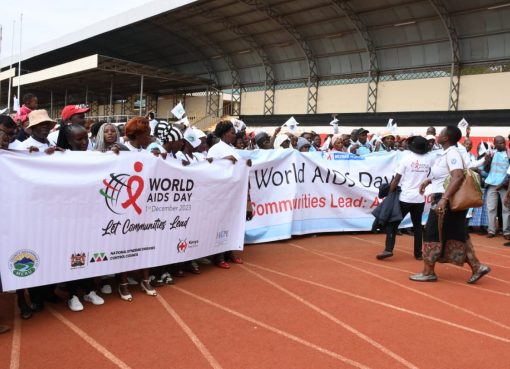The National Biosafety Authority (NBA) has announced plans to partner with more schools across the country in the ongoing national tree growing campaign.
Speaking at Loresho Primary School during a tree planting exercise in collaboration with Kenya Forest Research Institute, NBA acting Chief Executive officer Mr. Nehemiah Ngetich said the move will ensure that the Country achieves the target forest cover by 2032.
“We are proud to be part of this exercise that is being spearheaded by the national government led by President Dr. William Ruto to have 15 billion trees planted by 2032,” said Mr. Ngetich.
He disclosed that the Authority, as part of the initiative has already planted trees in a number of Primary schools in Meru County, Kiambu County and now in Nairobi with more schools targeted in the next quarter.
“We appreciate the management of Loresho Primary School for accepting to host us in this important national exercise,” said Mr Ngetich during the exercise that saw a total of 1,000 trees planted.
Out of the 1000 trees that were planted 500 were assorted trees while 500 were fruit trees.
“I urge you learners to take care of these trees as they will provide you with shelter and fruits in future as well as conserve the environment,” added Mr. Ngetich.
NBA is a State Corporation established under the Biosafety Act, Cap 320 of the Laws of Kenya with the mandate to exercise general supervision and control over the transfer, handling and use of Genetically Modified Organisms (GMOs) with a view to ensuring- safety of human, animal health and provision of adequate protection of the environment.
At the same time, Mr Ngetich revealed that the Authority (NBA) supports various initiatives in the Country to encourage students to pursue Biotechnology and Biosafety courses in higher learning institutions.
Mr. Ngetich observed that understanding biosafety is important for future scientists and responsible citizens.
“Let’s explore science responsibly and contribute to innovation. As a regulator, the NBA recognizes the importance of involving youth who are engaged with current biotechnologies,” said Mr. Ngetich.
He highlighted some career courses related to the Authority’s work such as Biotechnology Researcher, Environmental Scientist, Food Safety Officer, Biosafety Inspector and Science Communicator.
Ngetich emphasized the crucial role played by the Authority in ensuring the safe use of modern biotechnology in Kenya and regulating genetically modified organisms (GMOs) to protect human health, animal health and the environment.
“Biotechnology can improve agriculture, medicine, and industry. Without proper regulation, GMOs may pose environmental harm, unintended health effects, and ethical concerns and therefore NBA ensures that biotechnological advancements are safe and beneficial to Kenyans,” added Mr. Ngetich.
On the Authority’s role in science and innovation, Mr. Ngetich said the agency encourages safe research and development in biotechnology and biosafety, provides guidance to researchers and institutions on safety protocols, ensures responsible innovation and works with universities, research institutes, and industry stakeholders in realizing its mandate.
He added that the Authority has a duty to protect Kenyans by ensuring that GMO food and products are tested and safe, monitors environmental impacts of biotechnology and engages scientists, policymakers, and the public in decision-making.
Kenya signed Cartagena Protocol on Biosafety to the Convention on Biological Diversity (CBD) in 2000 and ratified it in 2003 with National Biosafety Authority as the national focal point.
This is an international agreement which aims to ensure the regulation of GMOs to ensure their safety to humans, animals and environment.
The protocol is part of the global convention on biological diversity (CBD) and provides a framework for the utilization of biotechnology while also recognizing the potential risks that may be posed by the new technologies.
By Joseph Ng’ang’a





